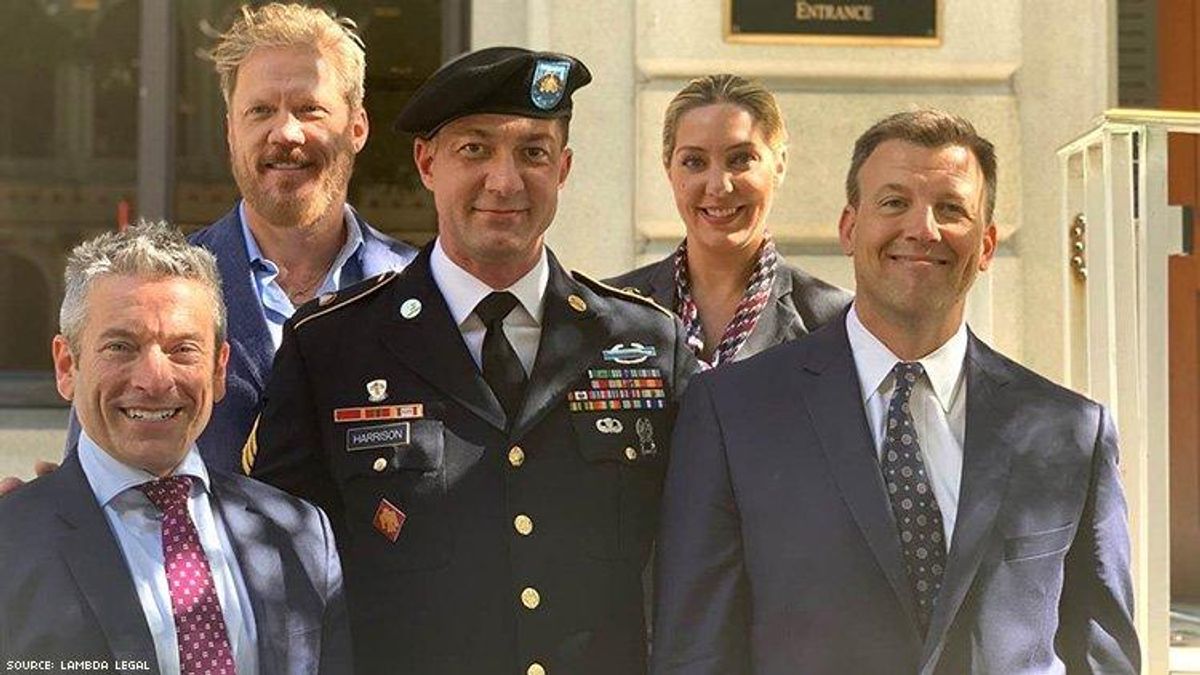Stigma
Trump's Firing of HIV-Positive Airmen Blocked Again

An appeals court says the Trump administration's efforts to discharge the airmen is at odds with modern science on HIV.
January 10 2020 9:53 PM EST
May 26 2023 2:21 PM EST
By continuing to use our site, you agree to our Private Policy and Terms of Use.

An appeals court says the Trump administration's efforts to discharge the airmen is at odds with modern science on HIV.
Above: lawyers in Roe & Voe v. Esper case, representatives of Lambda Legal and Modern Military Association of America, and plaintiff Sgt. Nick Harrison of companion lawsuit Harrison v. Esper
A federal appeals court Friday upheld a lower court’s ruling blocking the Trump administration from discharging HIV-positive members of the Air Force.
The administration had sought to discharge two airmen by claiming on the basis that they could not be deployed to the Middle East due to their HIV-positive status. But both men, diagnosed in 2017, are on antiretroviral treatment, have no symptoms, and have been pronounced physically fit to deploy by their doctors.
In February of last year, Judge Leonie M. Brinkema of the U.S. District Court for the Eastern District of Virginia issued a preliminary injunction against the discharge of the two airmen while their case proceeds to trial. The Department of Defense and the Air Force appealed, but the U.S. Court of Appeals for the Fourth Circuit upheld the injunction.
“A ban on deployment may have been justified at a time when HIV treatment was less effective at managing the virus and reducing transmission risks,” Judge James A. Wynn Jr. wrote for a three-judge panel of the court. “But any understanding of HIV that could justify this ban is outmoded and at odds with current science. Such obsolete understandings cannot justify a ban, even under a deferential standard of review and even according appropriate deference to the military’s professional judgments.”
“These servicemembers, like other HIV-positive individuals with undetectable viral loads, have no symptoms of HIV,” the ruling concluded. “They take daily medication — usually one pill, for some people two — and need a regular, but routine blood test. They cannot transmit the virus through normal daily activities, and their risk of transmitting the virus through battlefield exposure, if the virus can be transmitted at all, is extremely low. Although transmission through blood transfusion is possible, these servicemembers have been ordered not to donate blood. But the Government did not consider these realities when discharging these servicemembers, instead relying on assumptions and categorical determinations. As a result, the Air Force denied these servicemembers an individualized determination of their fitness for military service.”
The ruling came in the case Roe & Voe v. Esper (formerly Roe & Voe v. Shanahan), filed in December 2018 by Lambda Legal and Modern Military Association of America (formerly OutServe-SLDN) with pro bono co-counsel Winston & Strawn. It prevents the discharge of the two airmen identified by the pseudonyms Richard Roe and Victor Voe in the suit, in addition to other Air Force members living with HIV, according to Lambda Legal.
“This is the second federal court to find that the Trump administration’s attempt to discharge these individuals is unlikely to pass legal muster,” said Scott Schoettes, counsel and HIV Project director at Lambda Legal, in a press release. “At the root of these discharge decisions and other restrictions on the service of people living with HIV are completely outdated and bigoted ideas about HIV. Today’s ruling clears the way for us to definitively prove at trial that a person living with HIV can perform the job of soldier or airman as well and as safely as anyone else. We are confident Roe and Voe will succeed because the government is unable to offer a reasonable justification for their discriminatory treatment.”
Harrison v. Esper, a companion case challenging the Army’s refusal to commission an enlisted soldier as a JAG officer based on his HIV status, is set to proceed to trial alongside Roe and Voe v. Esper in the Eastern District of Virginia, likely in the spring. The same attorneys are working on both cases.